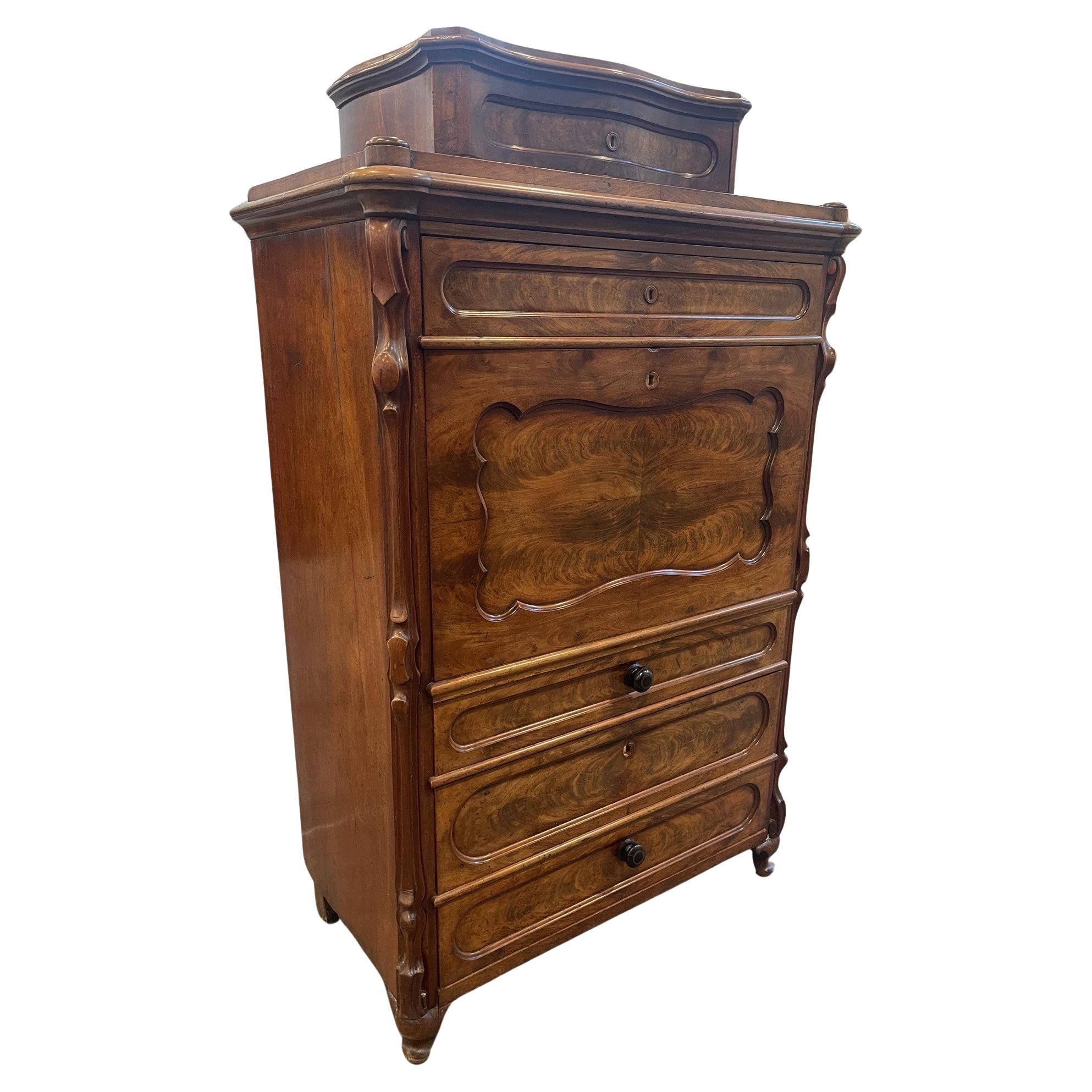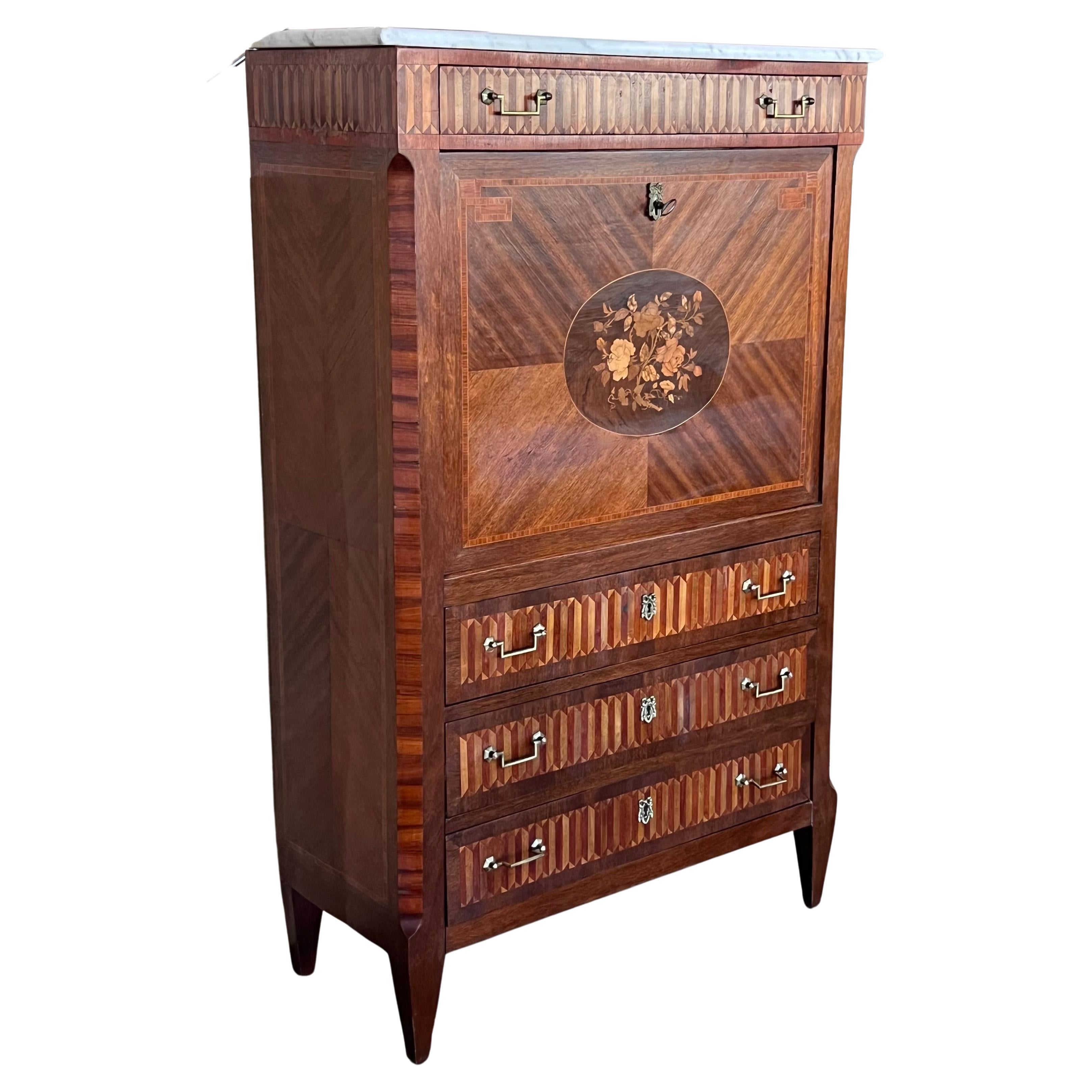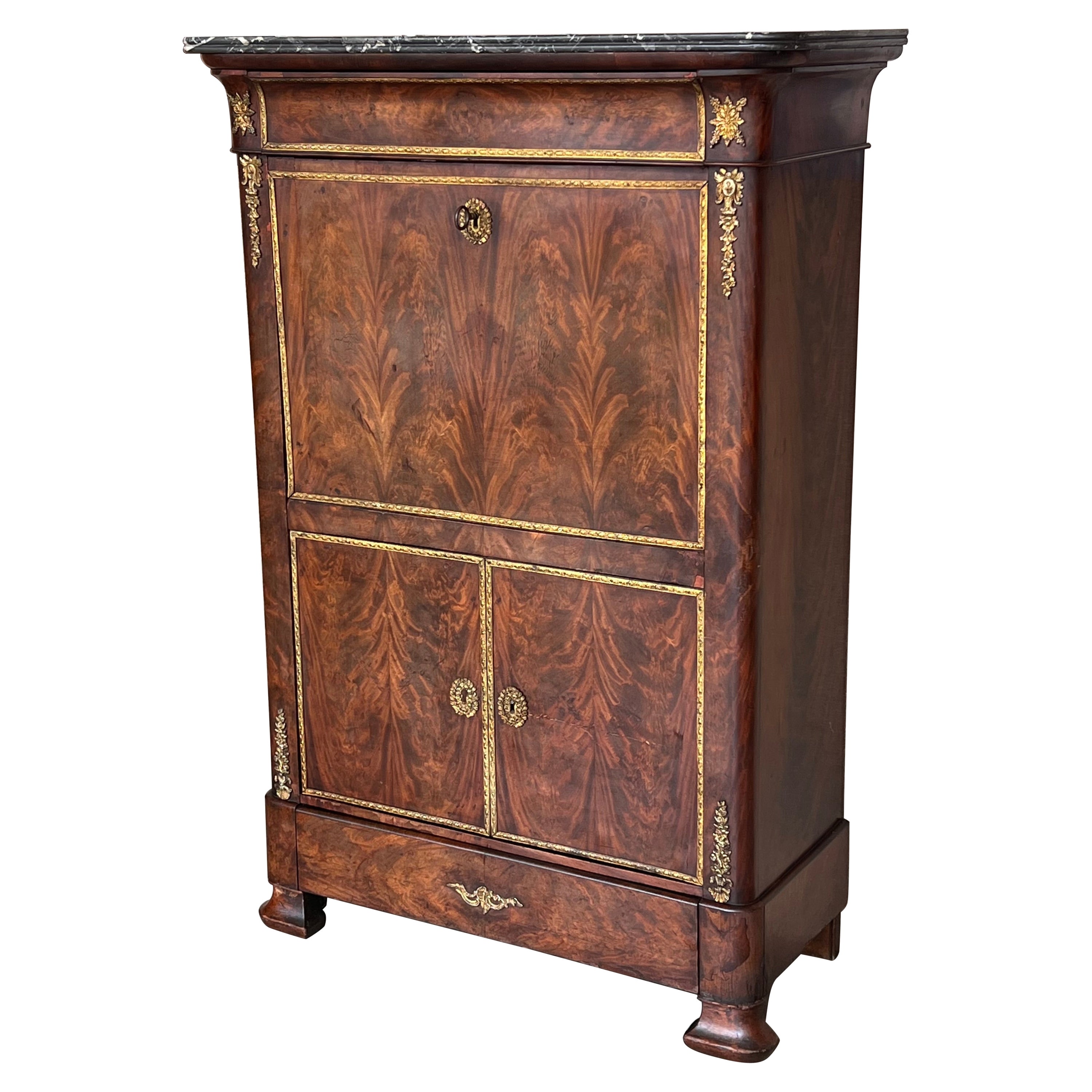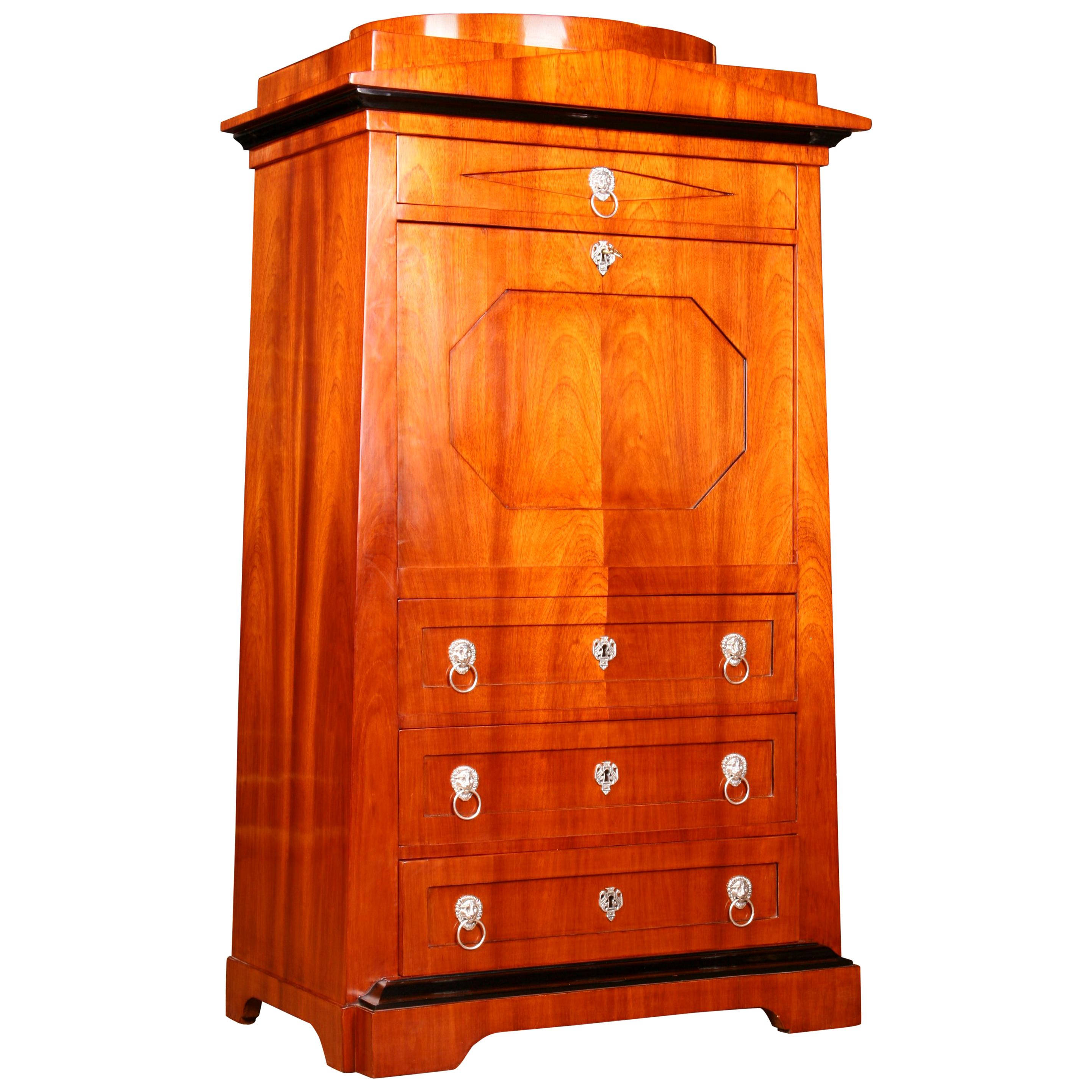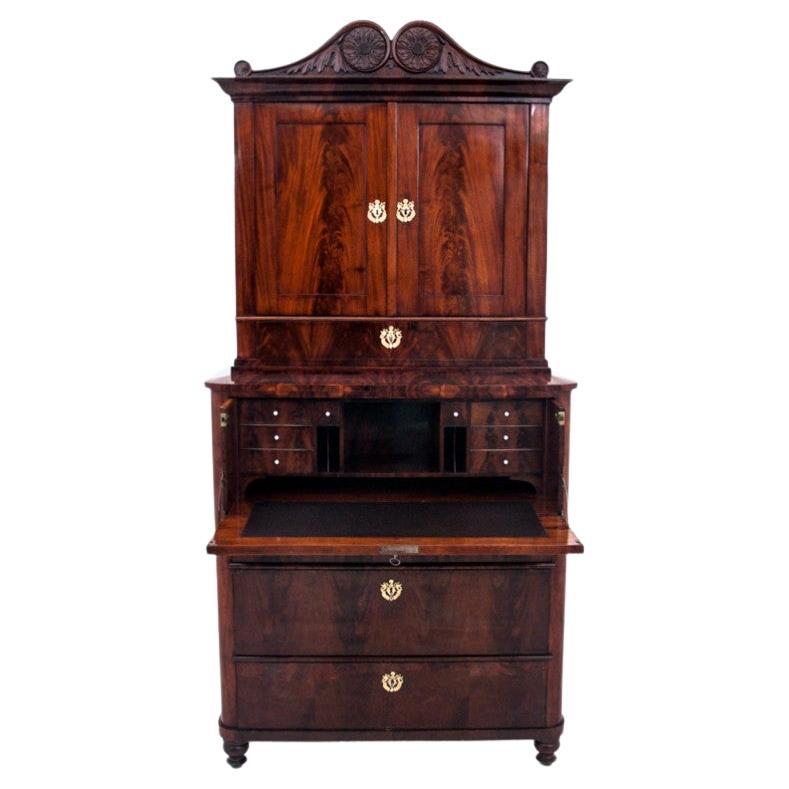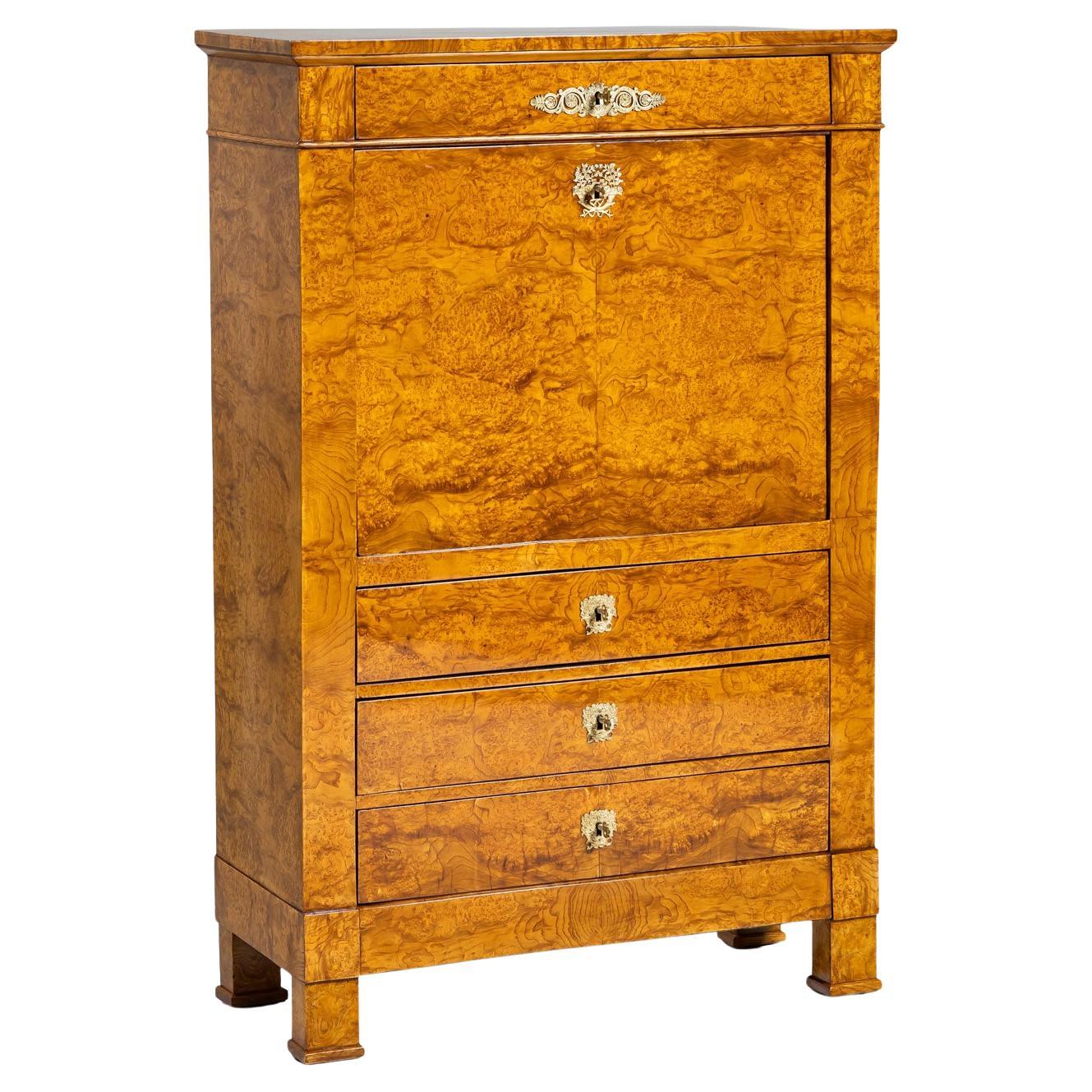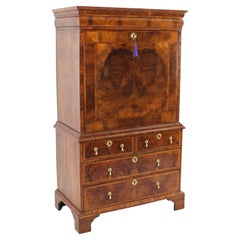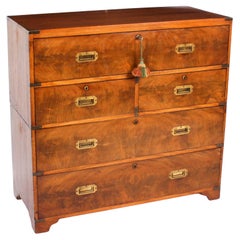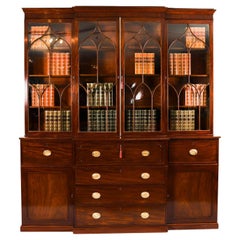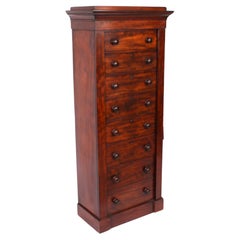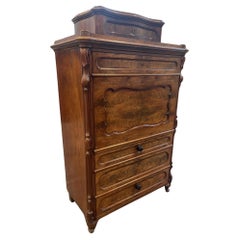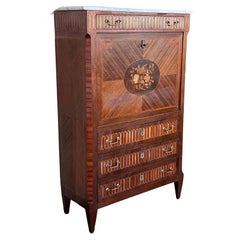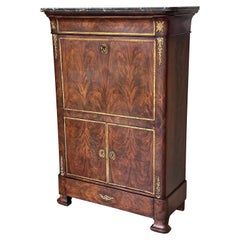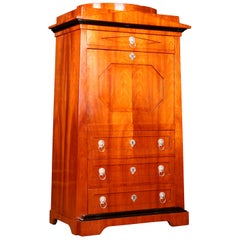Items Similar to Antique Biedermeier Secretaire Chest Secretaire Abattant 19th Century
Video Loading
Want more images or videos?
Request additional images or videos from the seller
1 of 22
Antique Biedermeier Secretaire Chest Secretaire Abattant 19th Century
$5,862.31
£4,250
€5,006.97
CA$8,052.46
A$8,953.87
CHF 4,687.51
MX$109,373.21
NOK 58,903.22
SEK 55,410.28
DKK 37,376.67
About the Item
A truly magnificent antique flame mahogany architectural biedermeier secretaire abattant, circa 1840 in date.
The top section with a projecting cornice over an arched panelled door enclosed by applied shaped mounts. The lower section with a frieze drawer over a fall front which opens to reveal a fabulous interior fitted with drawers and a central cupboard, above three full width drawers drawers below.
Complete with working locks and keys.
A fabulous example of the timeless Architectural style.
THE BOTANICAL NAME FOR THE MAHOGANY THAT THIS ITEM IS MADE OF IS SWIETENIA MACROPHYLLA AND THIS TYPE OF MAHOGANY IS NOT SUBJECT TO CITES REGULATION AND DOES NOT CONTAIN ANY RESTRICTED MATERIALS.
Condition:
In really excellent condition having been beautifully cleaned, polished and waxed in our workshops, please see photos for confirmation.
Dimensions in cm:
Height 199 x Width 113 x Depth 54
Dimensions in inches:
Height 6 foot, 6 inches x Width 3 foot, 8 inches x Depth 1 foot, 9 inches
Biedermeier period,
refers to an era in Central Europe during which arts appealed to common sensibilities in the historical period between 1815, the year of the Congress of Vienna at the end of the Napoleonic Wars, and 1848, the year of the European revolutions.
Although the term itself is a historical reference, it is predominantly used to denote the artistic styles that flourished in the fields of literature, music, the visual arts and interior design.
Biedermeier was an influential style of furniture design from Germany during the years 1815–1848, based on utilitarian principles. The period extended into Austria and Scandinavia.
Throughout the period, emphasis was kept upon clean lines and minimal ornamentation. As the period progressed, however, the style moved from the early rebellion against Romantic-era fussiness to increasingly ornate commissions by a rising middle class, eager to show their newfound wealth.
The idea of clean lines and utilitarian postures would resurface in the 20th century, continuing into the present day. The Biedermeier style was a simplified interpretation of the influential French Empire Style of Napoleon I, which introduced the romance of ancient Roman Empire styles, adapting these to modern early 19th century households. Biedermeier furniture used locally available materials such as cherry, ash and oak woods.
Biedermeier furniture and lifestyle was a focus on exhibitions at the Vienna applied arts museum in 1896. The many visitors to this exhibition were so influenced by this fantasy style and its elegance that a new resurgence or revival period became popular amongst European cabinetmakers.
This revival period lasted up until the Art Deco style was taken up. Biedermeier also influenced the various Bauhaus styles through their truth in material philosophy.
Flame Mahogany
Thomas Sheraton - 18th century furniture designer, once characterized mahogany as "best suited to furniture where strength is demanded as well as a wood that works up easily, has a beautiful figure and polishes so well that it is an ornament to any room in which it may be placed." Matching his words to his work, Sheraton designed much mahogany furniture. The qualities that impressed Sheraton are particularly evident in a distinctive pattern of wood called "flame mahogany."
The flame figure in the wood is revealed by slicing through the face of the branch at the point where it joins another element of the tree.
- Dimensions:Height: 78.35 in (199 cm)Width: 44.49 in (113 cm)Depth: 21.26 in (54 cm)
- Style:Biedermeier (In the Style Of)
- Materials and Techniques:
- Period:
- Date of Manufacture:circa 1840
- Condition:
- Seller Location:London, GB
- Reference Number:Seller: A27041stDibs: LU950631149772
About the Seller
5.0
Platinum Seller
Premium sellers with a 4.7+ rating and 24-hour response times
Established in 1983
1stDibs seller since 2012
1,388 sales on 1stDibs
Typical response time: <1 hour
Associations
LAPADA - The Association of Arts & Antiques Dealers
- ShippingRetrieving quote...Shipping from: London, United Kingdom
- Return Policy
Authenticity Guarantee
In the unlikely event there’s an issue with an item’s authenticity, contact us within 1 year for a full refund. DetailsMoney-Back Guarantee
If your item is not as described, is damaged in transit, or does not arrive, contact us within 7 days for a full refund. Details24-Hour Cancellation
You have a 24-hour grace period in which to reconsider your purchase, with no questions asked.Vetted Professional Sellers
Our world-class sellers must adhere to strict standards for service and quality, maintaining the integrity of our listings.Price-Match Guarantee
If you find that a seller listed the same item for a lower price elsewhere, we’ll match it.Trusted Global Delivery
Our best-in-class carrier network provides specialized shipping options worldwide, including custom delivery.More From This Seller
View AllAntique Queen Anne Walnut Secretaire Chest / Escritoire, 18th Century
Located in London, GB
A beautiful Queen Anne walnut secretaire chest / escritoire, circa 1710 in date.
The upper section features a moulded cornice above a secret bulge front frieze drawer, this is above a hinged fall front clad in burr walnut-figured book veneers framed in broad cross-banded borders edged with feather-banding.
The interior housing three pairs of pigeon holes concealing secret compartments above a central cupboard flanked by three side drawers on each side with six further drawers below, all clad in burr figured veneers edged with feather banding and fitted with brass pendant handles. The rear of the central cupboard is a concealed panel that sildes away to reveal four further secret drawers.
The base of the chest comprises two half-width drawers above two full width drawers, all fitted with pendant shaped brass drop handles, The cabinet is raised on bracket feet.
The walnut secretaire is outlined throughout with decorative herringbone stringing.
Complete with working locks and original keys.
Condition:
In excellent condition having been beautifully cleaned polished and waxed in our workshops, please see photos for confirmation.
Dimensions in cm:
Height 176 x Width 102 x Depth 59
Dimensions in inches:
Height 5 foot, 9 inches x Width 3 foot, 4 inches x Depth 1 foot, 11 inches
Anne was Queen of England, Scotland and Ireland from 8 March 1702 until 1 May 1707. On 1 May 1707, under the Acts of Union, the kingdoms of England and Scotland united as a single sovereign state known as Great Britain. Anne continued to reign as Queen of Great Britain and Ireland until her death in 1714.
The Queen Anne style of...
Category
Antique 1710s Queen Anne Cabinets
Materials
Walnut
Antique Victorian Campaign Era Military Secretaire Chest of Drawers 19th Century
Located in London, GB
This is beautifully crafted antique early Victorian teak military campaign secretaire chest of drawers dates from Circa 1840.
The top drawer opening to a pull out secretaire fitted with a small drawer, pigeon hole compartments and an inset gold tooled brown leather writing surface. This is over two short drawers over two full width drawers.
The brass-bound chest was made in two parts, accented with inset brass hardware, for ease of transport.
Add this splended military secretaire...
Category
Antique 1840s Commodes and Chests of Drawers
Materials
Wood
Antique George III Secretaire Breakfront Bookcase 19th Century
Located in London, GB
This is elegant antique George III period flame mahogany secretaire breakfront bookcase, circa 1820 in date.
It is of wonderful quality, has a rich and striking grain, and has been...
Category
Antique Early 19th Century English George III Bookcases
Materials
Leather, Glass, Mahogany
Antique George IV Mahogany Wellington Chest 19th Century
Located in London, GB
A fine antique well proportioned flame mahogany George IV Wellington chest, in the manner of Gillows, Circa 1830 in date.
With fabulous original colour, original handles, ash and ce...
Category
Antique 1830s George IV Commodes and Chests of Drawers
Materials
Mahogany
19th Century French Rococo Revival Marquetry Secretaire a Abattant
Located in London, GB
Dating from around 1850, this is a wonderful antique French Rococo Revival Secretaire a Abattant featuring ormolu mounted mahogany, gonzalo alves and marquetry.
A Secretaire a abatt...
Category
Antique 1850s French Rococo Revival Secretaires
Materials
Marble, Ormolu
Antique Victorian Pollard Oak Sideboard Chiffonier 19th Century
Located in London, GB
A superb quality Victorian flame pollard oak inverted breakfront sideboard, circa 1870 in date.
The sideboard features three drawers in the frieze and a breakfront design with three paneled doors below opening to cupboards with shelves
Add an elegant touch to a special place in your home with this superb antique Victorian sideboard...
Category
Antique 1870s English Victorian Sideboards
Materials
Oak
You May Also Like
A Biedermeier Chest with Secretaire Circa 1850
Located in Flower Mound, TX
A magnificent mid 19th century Biedermeier chest with figured mahogany secretaire cabinet, with a raised serpentine single drawer, a frieze drawer over paneled fall front, and the in...
Category
Antique Mid-19th Century German Biedermeier Secretaires
Materials
Mahogany
19th Century Empire Drop-Front Oak Secretary Desk or Abattant, Chest France
Located in Miami, FL
Secretaire a abattant, France circa 1820, Biedermeier period. The outside with fall front and two drawers flanked by two ebonized columns shows a beautiful oak veneer design. The woo...
Category
Antique Early 19th Century French Biedermeier Secretaires
Materials
Bronze
19th Century Empire Drop-Front Oak Secretary Desk or Abattant, Chest France
Located in Miami, FL
Secretaire a abattant, France circa 1820, Biedermeier period. The outside with fall front and two drawers flanked by two ebonized columns shows a beautiful oak veneer design. The woo...
Category
Antique Early 19th Century French Biedermeier Secretaires
Materials
Bronze
Secretaire Writing Cabinet in Antique Biedermeier Style Mahogany veneer
Located in Berlin, DE
High quality rosewood veneer on solid conifers. Conical body on profile frames. Base in the front, between four drawers, straight flap with shield-shaped filling. Behind it is a richly divided compartmental division of a bent temple-shaped central compartment with mirrored full columns, flanked by star-starved drawers. Over cantilevered profile cornice flat gypsum, stepped with oval cover plate. Front. All drawers and backboard made of solid wood. So-called pyramid furniture...
Category
Antique 19th Century German Biedermeier Secretaires
Materials
Mahogany
Antique secretary from around 1850, Northern Europe.
Located in Chorzów, PL
Impressive secretary from the mid-19th century in Biedermeier style. Antique furniture with a more beautiful form will add elegance to any interior. A representative piece of furnitu...
Category
Antique 1850s Scandinavian Biedermeier Secretaires
Materials
Walnut
Biedermeier Secretary Desk, Mid-19th Century
Located in Greding, DE
Secretary desk with exquisite ash veneer and a three-drawer commode base. Behind the leather-covered writing surface lies a spacious arched compartment, complemented by six small dra...
Category
Antique Mid-19th Century Biedermeier Secretaires
Materials
Bronze
More Ways To Browse
Antique Fantasy Furniture
Antique Music Table
Antique Desk Ornaments
Empire Vienna
Antique 6 Panel Doors
Flame Mahogany Desk
Music Desk
Roman Thomas Furniture
Roman Thomas
French 3 Drawer Chest
Antique 3 Drawer Chests
Napoleonic Tables
3 Drawer End Table
Antique Chest Of Drawers German
19th Century Cherry Chest Of Drawers
Antique Doors Made Into Tables
Antique Sheraton Desks
Empire Mahogany Writing Desk
